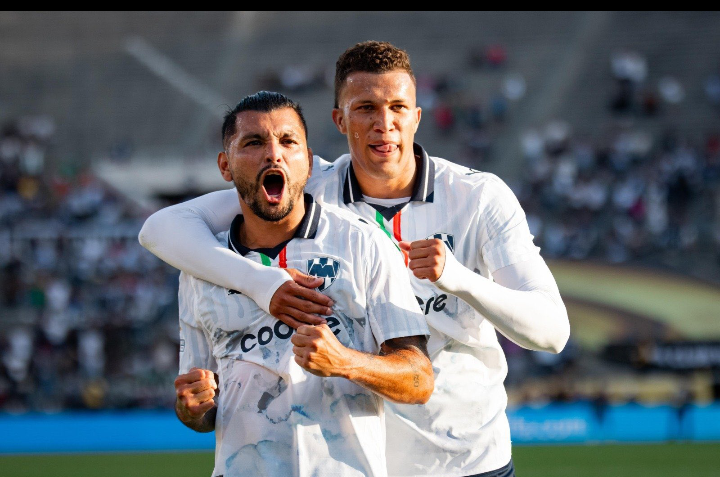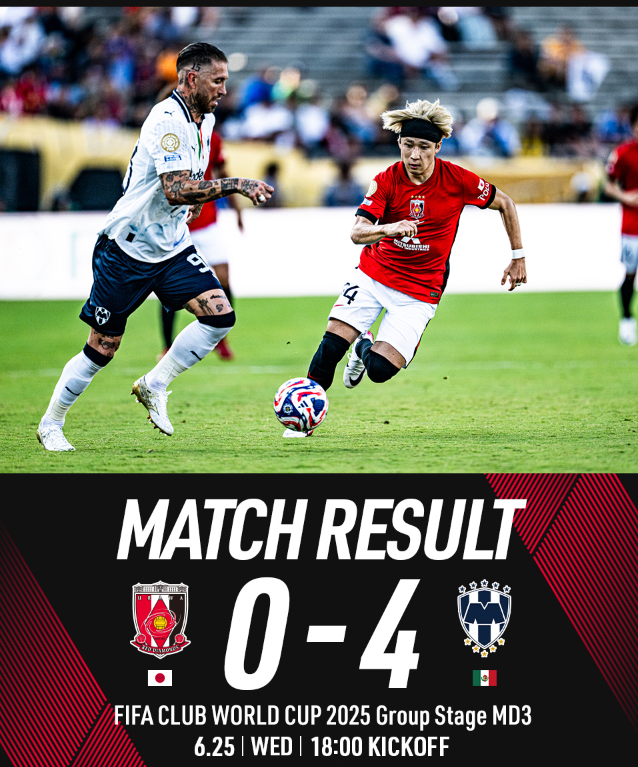On June 26, 2025, the Rose Bowl Stadium in Pasadena, California, played host to a high-stakes encounter between Japan’s Urawa Red Diamonds and Mexico’s CF Monterrey in the final matchday of Group E at the FIFA Club World Cup. This match, a pivotal moment for both teams, ended in a commanding 4-0 victory for Monterrey, securing their place in the round of 16 while eliminating Urawa Reds and River Plate from the tournament. This blog dives into the details of the match, the performances of both teams, key moments, and the broader implications for the FIFA Club World Cup 2025.
The Build-Up: Stakes and Expectations
The stage was set for a Urawa Reds vs. Monterrey dramatic showdown. Urawa Red Diamonds, already eliminated from knockout contention with zero points after losses to River Plate (3-1) and Inter Milan (2-1), were looking to salvage pride and end their campaign on a high note. Despite their elimination, the Japanese side had shown flashes of attacking quality, scoring in both of their previous matches. However, their defensive frailties had been exposed, conceding five goals across those two games.
Monterrey, on the other hand, entered the match with everything to play for. Sitting third in Group E with two points from draws against River Plate (0-0) and Inter Milan (1-1), the Rayados needed a convincing victory over Urawa and favorable results elsewhere to advance. A win alone wouldn’t suffice; they also required either Inter Milan or River Plate to lose, or a specific goal differential scenario to break a potential three-way tie. With veteran defender Sergio Ramos anchoring their defense and contributing their only goal in the tournament thus far, Monterrey were determined to seize this opportunity.

This was the first-ever official meeting between Urawa Reds and Monterrey, adding an element of unpredictability to the contest. Urawa, known for their passionate fanbase and technical play, faced a Monterrey side renowned for their physicality and tactical discipline, led by coach Fernando Ortiz. The match promised intensity, and it delivered in spades.
First Half: Monterrey’s Ruthless Efficiency
From the opening whistle, Monterrey asserted their dominance. The Mexican side controlled possession, holding 59% of the ball compared to Urawa’s 41%, and their attacking intent was clear. Urawa, despite their elimination, started with purpose, creating early chances through Matheus Sávio and Ryoma Watanabe, who forced a corner in the opening minutes. However, Monterrey’s goalkeeper, Esteban Andrada, was quick to thwart any danger, notably stopping a Japanese attack with a timely intervention.
The turning point came in the 30th minute when Nelson Deossa unleashed a stunning strike. His long-range effort, described as a “golazo” by observers, caught Urawa’s goalkeeper Shusaku Nishikawa off guard, who could only parry the ball into the net. The goal sparked Monterrey into life, and just four minutes later, Argentine striker Germán Berterame doubled their lead. A precise assist from Alfonso Alvarado allowed Berterame to slot home, showcasing Monterrey’s clinical finishing.
The onslaught continued as Jesús Corona added a third in the 39th minute, capitalizing on a well-worked move orchestrated by Óliver Torres. Monterrey’s quickfire goals in an eight-minute span stunned Urawa, who struggled to regain their footing. By halftime, the scoreline read 3-0, with Monterrey’s attacking trio of Deossa, Berterame, and Corona proving too much for Urawa’s defense. The Japanese side’s eight corners compared to Monterrey’s one highlighted their effort to create chances, but their inability to convert left them vulnerable.
Second Half: Urawa’s Fight and Monterrey’s Final Blow
Urawa made tactical adjustments at halftime, bringing on Thiago Santana and Taishi Matsumoto to inject energy into their attack. The substitutions sparked moments of promise, with Matheus Sávio continuing to orchestrate plays and earning multiple corners. However, Monterrey’s defense, marshaled by Sergio Ramos, remained resolute. Ramos, a key figure for Monterrey throughout the tournament, was instrumental in neutralizing Urawa’s attacking threats.
Monterrey’s substitutions, including Gerardo Arteaga and Víctor Guzmán, kept their momentum intact. Despite Urawa’s persistence, they couldn’t find a breakthrough, with Andrada’s goalpost even saving a potential Urawa goal early in the second half. As the match neared its end, Monterrey sealed the rout in the 97th minute with Berterame’s second goal, a clinical finish that underscored their dominance. The final score of 4-0 reflected Monterrey’s superior quality and determination.
Key Performers and Tactical Insights
Monterrey’s victory was a testament to their balanced approach. Nelson Deossa’s opening goal was a moment of individual brilliance, while Germán Berterame’s brace highlighted his importance as a finisher. Jesús Corona’s goal and Óliver Torres’ playmaking added depth to Monterrey’s attack, with the team recording 13 shot attempts, five on target, compared to Urawa’s 10 attempts and two on target. Sergio Ramos, though not on the scoresheet, was a colossus at the back, ensuring Monterrey’s defense held firm despite Urawa’s eight corners.
For Urawa, the match exposed their defensive vulnerabilities. While players like Matheus Sávio and Ryoma Watanabe showed creativity, their backline, including Marius Høibråten and Takahiro Sekine, struggled to contain Monterrey’s attacking waves. Goalkeeper Shusaku Nishikawa faced criticism for his role in Deossa’s goal, though he made two crucial saves to prevent an even heavier defeat. Urawa’s inability to convert their chances, despite their attacking intent, was a recurring theme in their Club World Cup campaign.
Tactically, Monterrey’s high pressing and quick transitions overwhelmed Urawa. Coach Fernando Ortiz’s decision to maintain an aggressive approach, even after taking the lead, ensured Urawa had little time to settle. Urawa, under coach Maciej Skorża, attempted to play out from the back but were often caught out by Monterrey’s relentless pressure. The match statistics—59% possession for Monterrey, 13 shots to Urawa’s 10, and a stark contrast in shots on goal—underscored the Mexican side’s dominance.
The Bigger Picture: Group E and Beyond
Monterrey’s 4-0 win, coupled with Inter Milan’s victory over River Plate, reshaped Group E’s final standings. Inter Milan topped the group with seven points, followed by Monterrey with five. River Plate, despite their four points, were eliminated due to an inferior goal differential, while Urawa finished bottom with zero points. Monterrey’s emphatic performance secured their place in the round of 16, where they will face Borussia Dortmund, while Inter Milan will take on Fluminense.
For Monterrey, this victory was a statement of intent. As one of the last Concacaf representatives in the tournament, alongside Inter Miami, their advancement carries significant weight for the region. Sergio Ramos’ leadership and the contributions of players like Berterame and Deossa highlight Monterrey’s potential to challenge Europe’s elite in the knockout stages.
Urawa, despite the loss, can take heart from their attacking displays throughout the tournament. Their matches against River Plate and Inter Milan showed they could compete with top teams, but defensive lapses and a lack of clinical finishing ultimately cost them. As they return to the J1 League, Urawa will look to build on their attacking foundations and address their defensive shortcomings.
Fan Reactions and Atmosphere
The Rose Bowl Stadium, with an attendance of 14,312, provided a vibrant backdrop for the match. Fans of both teams created an electric atmosphere, with Urawa’s passionate supporters traveling in numbers to support their side despite their elimination. fans praising Monterrey’s clinical performance and lamenting Urawa’s defensive struggles.
Conclusion
The Urawa Reds vs. Monterrey clash was a microcosm of the FIFA Club World Cup’s intensity and unpredictability. Monterrey’s 4-0 victory showcased their attacking prowess and defensive solidity, propelling them into the knockout stages. For Urawa, the match was a bittersweet end to a challenging campaign, marked by moments of promise but ultimately defined by their inability to compete defensively. As the tournament progresses, Monterrey’s performance serves as a reminder of Concacaf’s growing influence, while Urawa’s experience will fuel their ambitions for future international competitions.
